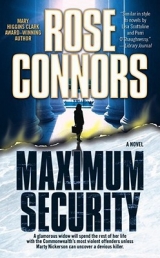
Текст книги "Maximum Security"
Автор книги: Rose Connors
Соавторы: Rose Connors
Жанры:
Криминальные детективы
,сообщить о нарушении
Текущая страница: 7 (всего у книги 14 страниц)
CHAPTER 15
Officer Glover lays a hand on top of Louisa’s head as she lowers herself into the backseat of the cruiser. She swats at him. “Don’t touch me,” she says, enunciating her Southern-speak precisely. “Keep your hands to yourself, young man.”
Glover backs away from her, looks first at the Chief and then at Mitch Walker. Mitch pops a stick of gum into his mouth and elbows the Kydd. “She’s a feisty one, hey, Counselor?” He grins and holds out the yellow pack, offering the Kydd a stick of Juicy Fruit.
The Kydd shakes his head. He looks pale, a little bit sick.
The troopers finished the evidence search quickly, filling their crate with items of little significance, as far as I could tell. The notable exception, of course, was Herb Rawlings’s handwritten apology. Officer Holt brought the solitary page from the sunroom, bagged it, and delivered it to the Chief instead of the evidence crate. Tommy Fitzpatrick scanned it quickly at first, then read it over more carefully, and then stared across the room at me. He asked nothing.
The Commonwealth’s lab technicians weren’t so speedy. The duo arrived in time to put an end to my oceanside conversation with the Chief and then spent hours dusting, brushing, and photographing. They scrutinized the entire house, even spent a good chunk of time in the basement. Their efforts struck me as overkill, given that Herb Rawlings perished at sea. The two huddled periodically, compared notes, and then continued their work. Unlike the Chatham cops, the state guys were secretive about the items they confiscated, carrying lidded crates out to their van every half hour or so. They didn’t wrap it up until more than three hours after they’d arrived. And by then, I was worried.
The Chief starts toward his car and slaps the Kydd on the back as he passes. “The DA wants to arraign this afternoon,” he says to me.
The DA seems to be in quite a hurry. The autopsy, the arrest, and the arraignment all in the space of twelve hours. At this rate, I expect she’ll schedule the trial to begin next Monday.
“At open session,” the Chief continues, “unless an earlier slot opens up.”
Open session starts at four o’clock each day in Judge Leon Long’s courtroom. No matter what case is in progress before him, Judge Long adjourns at four to tend to what he calls the “untidy” business of the system: matters no one put on the regular docket because no one saw them coming. Matters like Rinky Snow. And Louisa Rawlings.
The two cruisers back out of the driveway, lights active but sirens mute. Louisa stares straight ahead from the backseat of the lead car. She’s wearing a calf-length beige trench coat, a matching broad-rimmed hat, nylons, and heels. Teardrop diamonds glisten on her earlobes. Her jaw is rigid, her eyes hidden behind Versace sunglasses.
The Chief backs up next. Mitch Walker is in the passenger seat, still grinning and chewing his gum. He waves to the Kydd. The Kydd stares at him but doesn’t wave back.
Just like that, they’re gone. We stand silent for a moment in the oyster-shell driveway, the Kydd seemingly oblivious to the fact that I’m still planning to strangle him.
“Now where were we,” I ask, “before we were so rudely interrupted?”
He stares at me, blank.
“Oh, I know.” I feign a sudden recollection. “You were offering your opinion—your professional opinion, I believe it was—about the course this case is certain to follow.”
His eyes move to his feet—his bare feet.
“Any other opinions you’d like to share?”
He takes a deep breath, looks up at me again, and shakes his head. “What do we do now?” he asks.
I should tell him that we don’t do anything now, that we no longer work on this case, that we disqualified ourselves the minute we got involved with the client.
But I can’t. There’s more to be done than one person can do. And most of it should’ve been done yesterday. I need help and, as always, the Kydd is it.
“First of all,” I tell him, “we establish a few ground rules.”
He nods emphatically. He knows what’s coming.
“If she’s lucky enough to be back in her own home at the end of the day, you aren’t to be anywhere near the place.”
“I know,” he says, still nodding.
“You don’t set foot on this property again unless I’m with you.”
“Okay.” He stares at his feet.
“And no matter where she is, you act as her lawyer, nothing else.”
“I get it.”
“Every word that passes between you two had better be about the case. Nothing else.”
He looks up at me. “I get it,” he says again. “I swear I do.”
His eyes tell me he does.
“Marty,” he says, “would you do me a favor?”
“A favor?” He’s out of his mind.
He swallows hard. “Would you not mention this to Harry?”
Harry. Another problem. I’m silent for a few seconds, as if I’m thinking it over, but I’m not. I already know I won’t tell Harry. Questions about my motive would plague me if I did.
“If he sees anything between the two of you that makes him ask the question, I won’t lie,” I tell the Kydd. “But I won’t bring it up either.”
“Thanks,” he says. “So what do we do now?”
“We split up. You head to the courthouse. Get into lockup if you can. Nobody questions her. Nobody talks to her. She doesn’t utter a word. Not even to the janitor.”
He nods. He knows this drill. He’s done it before.
“And call me if it looks like arraignment will happen before four,” I add. “I’ll keep my cell turned on.”
“Where will you be?” he asks.
“At the Fish Pier. I want to have a word with Taylor Peterson and his crew, if I can find them.” I fish my keys from my pocket and head for the Thunderbird.
When I back up, the Kydd is planted right where I left him. He makes me think of Lot’s wife, after she looked back at Sodom and turned into a pillar of salt. I stop in front of him and roll down my window. “Before you head to lockup, Kydd, remember the rules.”
He squares his shoulders in the morning sunshine, no doubt bracing for a continuing lecture on the Canons of Professional Conduct.
“Lockup’s a lot like the corner grocery store,” I tell him instead. “No shirt. No shoes. No service.”
CHAPTER 16
It’s one o’clock by the time I park in the upper lot of the Chatham Fish Pier. This morning’s sunshine has taken a powder and it seems more like twilight here than midday. I get out of the Thunderbird and the sky rumbles, fair warning of what lies not far ahead. Out over the Atlantic, a single sword of lightning stabs the horizon, Mother Nature’s version of the Nike logo. And as if on cue, large globes of rainwater land on my face and hands.
Sheets of Chatham fog roll in from the roiling ocean as I hurry down the steep hill to the lower lot. Parking here is officially by permit only, unofficially for trucks only. The lot is packed with pickups, old and new, pampered and trashed. Their beds are laden with stacks of empty fish totes, mounds of entangled nets, and coils of thick black chain. And, though the National Dairy Association would almost certainly object, more than a few of them sport bumper stickers that ask the all-important question: Got bait?
A few large box trucks are down here too, backed up to the dock, their rear double doors wide open. Two belong to wholesale fish buyers, the other to a commercial ice supplier. Guys in heavy hooded sweatshirts under orange oilskin overalls load and unload, using nothing but pure brawn. I recognize a couple of the younger guys from Luke’s crowd; they should be hauling textbooks through the hallways of the high school instead.
Taylor Peterson’s boat, Genesis, is one of a half dozen commercial fishing vessels tied up at the dock. I use the pier’s wooden pilings to steady myself as I lower onto its deck. Two bearded crewmen sit on inverted bait buckets, mending nets. They have a six-pack of Coors on the deck between them, an open bottle next to each bucket. They look up when I arrive, but say nothing, as if middle-aged women in suits climb aboard all the time. But then again, I remind myself, these are the guys who hauled in a corpse with this morning’s first codfish catch. On the list of the day’s surprises, I’m a distant second at best.
“Taylor here?” I ask.
One of them moves his hands, net and all, toward an opening in the center of the deck. “Down below,” he says. “Captain’s down below.”
“You press?” the other one asks. “Captain doesn’t talk to press.”
Well, that’s the first good news I’ve heard today. “No,” I assure him. “I’m not press.”
They both lower their long beards to their chests and return to their mending. I have their blessings, I guess. I can go below.
Taylor is seated at a makeshift table, an upside-down brown wooden fish crate stacked on top of a larger upside-down green plastic one. There’s an open porthole behind him, salty wet wind gusting through it, but still the odor of codfish guts almost overpowers me as I reach the bottom of the ladder. Taylor looks up as I semi-stand in the cramped hold, a small but genuine smile spreading across his weathered face. “Marty,” he says, his dark eyes amused, “something told me I’d run into you today.”
I laugh, realizing I’ve sunk to a lifetime low. Dead bodies now herald my social calls.
“Or your partner,” Taylor adds.
“I drew the short straw on this one,” I tell him.
“Pull up a bucket,” he says, tipping backward on his.
I find an empty white one in the corner, flip it over, and wipe my hand across its bottom, hoping for the best. Gives a whole new meaning to bucket seats. I settle across from Taylor at the makeshift table and realize its surface is covered with nautical charts. But those aren’t what he’s been studying. On top of them, neatly lined up side by side, are four Polaroids. I scoot my bucket chair closer to Taylor’s, so I can look at them right side up. And I don’t need to ask what—or who—I’m looking at.
The first photograph is one of Herb Rawlings’s body, nude and horribly bloated, surrounded by hundreds of enormous, glistening silver codfish. Their bug-eyed expressions suggest they’re somewhat shocked to find Herb in their midst. The second is a snapshot of his corpse too, but in this one he’s been moved away from the rest of the catch, quarantined, and the handiwork of the bottom feeders can be seen on his extremities. The third and fourth shots are close-ups: one of Herb’s tightly tied wrists, the other of his similarly bound ankles.
Taylor shakes his head and chuckles a little. “Now there’s something you don’t see every day,” he says.
It occurs to me that I’m looking at something else you don’t see every day: Taylor Peterson sitting still. Taylor is one of the hardest-working commercial fishermen in town, always has been, even when we were in high school. He’s not staring at these pictures because he’s got nothing else to do.
“What is it?” I ask him.
“What’s what?”
I tap the fish-crate table near the photographs. “What bothers you?”
He lowers the front edge of his bucket chair, stares down at the Polaroids, and then looks back up at me, shaking his head. “I’m not a detective,” he says.
“I know that,” I tell him. “If you were, you wouldn’t be talking to me.”
He nods, acknowledging the point, and pulls the two close-up shots to the edge of the fish crate closest to us. “These,” he says. “These bother me.”
I wait. Taylor Peterson knows me well enough to know I won’t leave until he tells me why.
“The rope,” he says, pointing to the wrist shot. “It’s a six-thread sinking pot warp.”
“What’s it called in the English-speaking world?”
He laughs. “It’s a blend of polypropylene and Dacron,” he says, “so it’s also known as poly-dac.” He takes a knife and a roll of black electrical tape from the pocket of his oilskins, then reaches up to a coil of rope hanging from a nail overhead. He cuts off an eight-inch length and binds one end with the tape. “It’s this,” he says, handing it to me. “Fishermen’s rope. You’ll find it on every commercial boat in the harbor.”
The rope is a plait of three separate cords, woven together the way some women braid their hair. I unravel it and realize that each cord is actually a collection of dozens of finer strands, all but two of them white. A red and a black stand out in the middle section.
Taylor reaches over and fingers the innermost strands of the center cord. “Feel those,” he says, and I do. They’re white like most of the others, but the texture is different, coarser.
“That’s the polypropylene,” he says. “It floats.”
“It floats,” I repeat.
“Unless,” Taylor continues, reaching over to finger the ends of my unraveled rope, “it’s embedded in this much Dacron.”
“And then it doesn’t float,” I venture. “It sinks.”
He nods. “That’s why it’s the fishermen’s rope. It’s got the strength of the poly at its core, the abrasion resistance of the Dacron on its exterior, and the right ratio to allow the Dacron to override the buoyancy of the poly.”
“So it sinks,” I repeat. “And that’s why it’s called a sinking…”
“Pot warp,” he finishes for me.
“Are we talking about lobster pots?”
“Very good,” he says, looking every inch the distinguished professor.
“Well, that makes sense,” I tell him. “Herb Rawlings—the dead guy—probably had the rope on board. He had a few lobster pots out. Nothing commercial. A family license.”
Taylor snaps his fingers. That piece of information seems to be significant. “Okay,” he says, pointing at me, “then that explains the rope. And ten bucks says he kept his pots in the channel.”
He did. Louisa said so. “How did you know that?” I ask Taylor. Lobster pots are all over Cape Cod waters. Herb Rawlings’s pots could have been anywhere.
“This,” he says. He puts the other close-up shot, the one of the dead man’s ankles, on top of the wrists shot. “Look at the free end of the rope,” he tells me.
Herb Rawlings’s ankles are bound tightly in this photo with what I now know is poly-dac, just as his wrists were in the last one. The ankle poly-dac, though, has what appears to be a thin cable attached to its end. And something that looks like the eye portion of a hook and eye attached to that.
“What is it?” I ask Taylor.
“You can’t really tell from the photograph,” he says. “But I got a good look at the whole apparatus before they carted him away. This strip”—Taylor uses a chewed-up pencil to point at the narrow cable in the photo—“is a plastic-jacketed wire. It would have been used to attach the body to something heavy, to weigh it down.”
“Like what?”
He shrugs. “Tough to say. This harbor is full of equipment that could weigh a man’s body down for the next century. It could’ve been just about anything. A mushroom, a trawl anchor, hell, even a decent length of sweep chain would do it.”
“But I thought it was the Dacron that sank.”
He smiles and shakes his head. “The Dacron makes the rope sink,” he says. “It wouldn’t hold a body down.”
I should’ve figured that much out for myself, of course. I’m lost, so I decide to move on for a minute. Sometimes that helps. “And what’s this?” I ask, pointing to the little eyelet on the end.
“That’s a pop-up,” he says. “Or part of one anyhow.”
I’m in a vocabulary class, it seems. “Help me here,” I tell Taylor. “To me, a pop-up is one of the little creatures that jumped off the storybook page when Luke was a toddler.”
He laughs. “Well, to us,” he says, “us fisher types, a pop-up is a TFR—a timed float release.” He smiles at me and tugs at his short, dark beard. He knows I don’t know what the hell he’s talking about. He also knows I desperately want to.
“Spill,” I tell him, “or I’ll be unavailable the next time one of your crewmen calls from lockup after the barrooms close.”
He laughs again, harder. “Whoa,” he says, “take it easy. That’s my livelihood you’re talking about. Them’s fightin’ words.”
I rest my forearms on the fish tote and wait.
“TFRs,” he says, “are underwater timers. They have a lot of uses, but around here they’re most often used to hide gear.”
“Hide gear?”
“Right,” he says. “If you’ve got traps set in the channel, say, and you’re not going to check them for a few days, you can use TFRs to hold the buoys and the lines underwater for that long. From the surface, no one can tell where your traps are.”
“So no one can steal your catch?”
He shrugs. “Some guys use them for that reason,” he says. “Poaching happens. But the bigger concern—in the channel, anyhow—is traffic. The volume of boat traffic out there is so high that gear gets taken out by accident all the time. And when that happens, you lose more than your catch. You’ve got to replace the damned gear.”
I shake my head. “But if no one else can tell where your traps are, how can you?”
“You can’t,” he says, “until the TFRs let go and your buoys pop up.”
I’m still lost and the look on Taylor’s face tells me he knows it. “Stay with me,” he says. “I can explain.”
He grabs a coffee can from the shelf behind him and roots through it. “This,” he says, handing me a small metal gadget, “is a pop-up. Just like the poly-dac, you’ll find a bunch of those in a bunch of different sizes on just about every boat in the harbor.”
This one is a little bigger than my thumb, a pewter-colored barrel with an eyelet on either end.
“If I’m not going to check my traps for a week,” he says, “I can use one of these on each of them. I attach one end of it to the trap, the other to the buoy. The weight of the trap holds the buoy—and the lines—down. My gear sits on the ocean floor, out of traffic, for the week.”
“And then?”
“And then the pop-up releases,” he says. “It lets go in the middle and my buoy floats to the surface when I want it to.”
“It’s accurate?”
“You bet it is,” he says. “It’s a little more complicated than I’m making it sound, though. Water temperature plays a part too—”
“Please,” I interrupt. “Keep it simple. Remember your audience.”
He smiles at me. “The bottom line is, if I know the size of the TFR that was used and the average water temperature for the time period we’re talking about, I can be out there in time to watch the gear float to the surface.”
I’m quiet for a minute, still fingering the little metal device.
“They come in different sizes,” Taylor says, “for different durations. Two-day, five-day, seven-day, you name it.”
I look up at him. I still don’t get it.
“That’s a seven-day,” he says, pointing to my pop-up. “And so is this.” He uses the pencil again and taps the photo of Herb Rawlings’s ankles. “But this is just one end of it. It would’ve let go in the middle, remember. The other end is still attached to whatever held the guy down there for a week.”
“Taylor, please, I still don’t understand. Can you just tell me what you’re thinking and why?” I’m starting to worry about time. My head aches. And I’ve got to escape these codfish guts.
“I’m just about there,” he says. “But I have a question for you first.”
“Just one?”
He shrugs. “For now. Do you know anything about where this guy was attacked? Whether he was on land or sea?”
I shake my head. Until this morning, I’d assumed that whatever happened to Herb Rawlings happened at sea. But this morning’s discovery changed that, I realize now. “I don’t have a clue,” I tell Taylor.
“Okay,” he says, “then here’s what we do know.” He points to the little gadget in the photograph, the used version of the one I’m still fingering. “That pop-up did what it was supposed to do,” he says.
My pulse quickens a little as the pieces of what Taylor’s been telling me start to meld. “Go on,” I tell him. “Please.”
“So somebody went to great lengths to hide a body,” he says, “but secured it to the ocean floor with a device that’s specifically designed to let it go after seven days.”
“Don’t stop,” I tell him. “I’m with you.”
He leaves his seat and starts pacing, hunched over, tugging at his beard. “There are two possibilities, I guess. But only one makes sense.”
“Nothing makes sense to me right now, Taylor, so tell me both.”
“Theoretically,” he says, “it’s possible that someone clobbered the guy on land, loaded him onto the boat, and then motored out to the Great South Channel to dump him.”
“Theoretically,” I repeat. “Why just theoretically?”
“Because to do that,” Taylor answers, “whoever it was would have to know boats. And he’d have to know a hell of a lot about these waters. Because he’d have to be able to negotiate the cut.”
The cut is a treacherous stretch off the coast of Chatham that keeps the Coast Guard’s helicopter rescue team busy year-round. It’s redefined every time a winter storm pummels the coastline; every time the beaches and sandbars get rearranged; every time a waterway opens up where none existed before.
“And anybody who knows how to negotiate the cut,” Taylor points at my pop-up again, “would know a TFR when he sees one. He’d sure as hell know better than to try to hide a body with it.”
“And the other possibility?” I’m pretty sure I know what’s coming.
“Simple,” he says. “The now-dead guy was alive and well when he left the dock. He motored out to the Great South Channel himself. And then he bought the farm. Whoever did him in was on board. Someone he knew.”
“And someone who didn’t know the nautical world,” I add. “Someone who didn’t know a damned thing about pop-ups.”
Taylor tilts his head to one side. “Looks that way to me,” he says. He stops pacing and eases back onto his bait bucket. “One thing we know for sure,” he adds. “The dead guy surfaced on schedule.”








